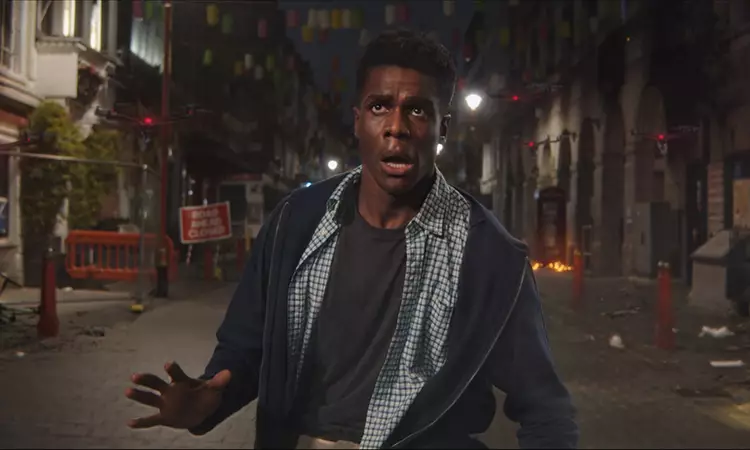The existential question of whether humanity is alone in the universe resonates deeply, prompting a spectrum of emotions from wonder to terror. This inquiry is poignantly encapsulated in Josephine Rose’s feature debut, “Touchdown,” which begins with an impactful quote from Arthur C. Clarke that sets the thematic tone for the film. As we enter a dystopian near-future setting, the narrative unfolds around the dramatic impact of meteors crashing into Earth’s oceans, marking not just a celestial event but the beginning of humanity’s confrontation with the unknown.
An Earthly Perspective
Unlike classic sci-fi films that often explore the cosmos, “Touchdown” restricts its milieu to the surface of the Earth, providing a gritty and raw lens through which to perceive first contact with an alien species. The story primarily revolves around Jamie, a young vlogger in London and his network of friends scattered across various cities. The looping back of their lives into the constraints of pandemic-life—housebound and under martial law—creates a pressing sense of urgency. As the extraterrestrial intruders emerge, visualizing the horrors through the eyes of this interconnected yet distanced group becomes a poignant allegory for the contemporary experience of isolation.
Through the lens of Jamie and his friends, “Touchdown” illustrates not only the physiological and psychological responses to an existential threat but also highlights contemporary themes of information dissemination and social connectivity. Faced with a reality that pits alien existence against human fear, the characters are helplessly trapped between official narratives provided by government officials, such as the Prime Minister, and the chaotic whirlpool of information flooding in from social media. The efforts to maintain personal connections online mirror the digital struggle many face in cultivating relationships during times of crisis, striking a relatable chord in the audience.
The film expertly delves into the realm of how media shapes perception and influences our understanding of both extraterrestrial phenomena and human relationships. As Jamie and his friends navigate the treacherous waters of misinformation, they embody the challenges of a generation overwhelmed by media. Their quest for truth amidst “citizen journalism,” conspiracy theories, and the delay in official updates changes the narrative arc from simple entertainment to a profound commentary on society’s grappling with reality in the digital age. The very tools designed to connect us often become sources of confusion and fear.
Strikingly, the film’s narrative impressively critiques governmental authority in the face of uncertainty. While the characters cling to online connections and camaraderie, the official response is fraught with patronizing platitudes and a pervasive desire for control. The portrayal of authoritative figures as more dangerous than the extraterrestrial entities raises unsettling questions about trust and safety. It leads viewers to ponder whether the human focus on managing fear through force is more perilous than allowing for uncertainty and exploration in the face of the unknown.
Amidst the chaos, the central theme of friendship emerges as the beacon of hope. Jamie and his friends’ determination to stay connected against the backdrop of existential terror encapsulates the human spirit’s resilience. Their interactions delve into the complexities of emotional support during crises, highlighting how genuine relationships can mitigate fear. Despite the distance that physical separation imposes, their camaraderie embodies the possibility of maintaining connection in challenging circumstances, using technology as an ally rather than an adversary.
“Touchdown” brilliantly intertwines the intrigue of potential extraterrestrial encounters with profound societal commentary, making the audience reflect on our human experience. It mirrors the challenges faced in understanding the unfathomable, both in alien contact and in navigating complex human relationships. Rose’s film resonates as a modern tale of connection amidst bewildering anxiety, emphasizing that, perhaps, the greatest challenge we face is not the unknown beyond our stars, but our struggle to understand ourselves and each other in the midst of overwhelming uncertainty.

